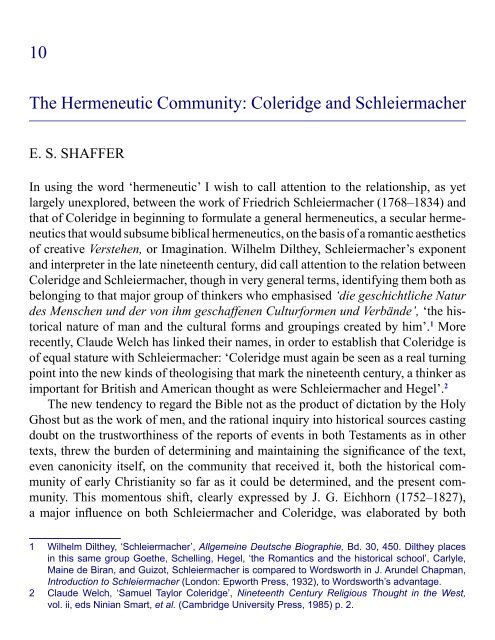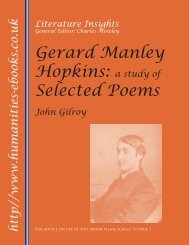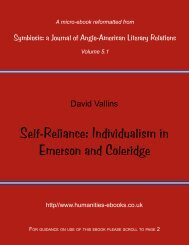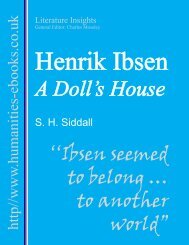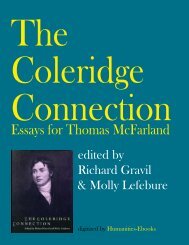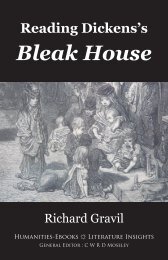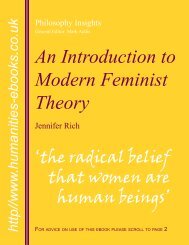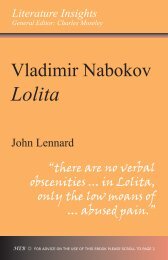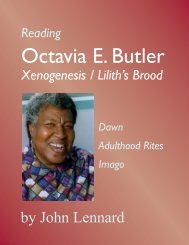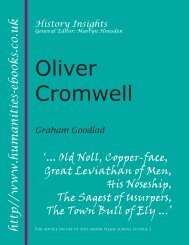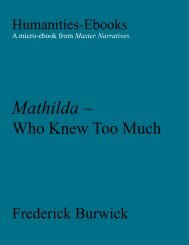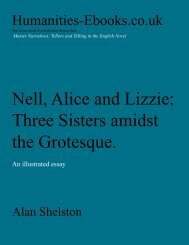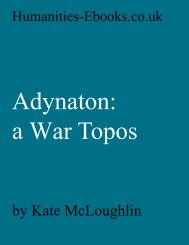Coleridge and Schleiermacher - Humanities-Ebooks
Coleridge and Schleiermacher - Humanities-Ebooks
Coleridge and Schleiermacher - Humanities-Ebooks
Create successful ePaper yourself
Turn your PDF publications into a flip-book with our unique Google optimized e-Paper software.
10<br />
The Hermeneutic Community: <strong>Coleridge</strong> <strong>and</strong> <strong>Schleiermacher</strong><br />
E. S. SHAFFER<br />
In using the word ‘hermeneutic’ I wish to call attention to the relationship, as yet<br />
largely unexplored, between the work of Friedrich <strong>Schleiermacher</strong> (1768–1834) <strong>and</strong><br />
that of <strong>Coleridge</strong> in beginning to formulate a general hermeneutics, a secular hermeneutics<br />
that would subsume biblical hermeneutics, on the basis of a romantic aesthetics<br />
of creative Verstehen, or Imagination. Wilhelm Dilthey, <strong>Schleiermacher</strong>’s exponent<br />
<strong>and</strong> interpreter in the late nineteenth century, did call attention to the relation between<br />
<strong>Coleridge</strong> <strong>and</strong> <strong>Schleiermacher</strong>, though in very general terms, identifying them both as<br />
belonging to that major group of thinkers who emphasised ‘die geschichtliche Natur<br />
des Menschen und der von ihm geschaffenen Culturformen und Verbände’, ‘the historical<br />
nature of man <strong>and</strong> the cultural forms <strong>and</strong> groupings created by him’. More<br />
recently, Claude Welch has linked their names, in order to establish that <strong>Coleridge</strong> is<br />
of equal stature with <strong>Schleiermacher</strong>: ‘<strong>Coleridge</strong> must again be seen as a real turning<br />
point into the new kinds of theologising that mark the nineteenth century, a thinker as<br />
important for British <strong>and</strong> American thought as were <strong>Schleiermacher</strong> <strong>and</strong> Hegel’. <br />
The new tendency to regard the Bible not as the product of dictation by the Holy<br />
Ghost but as the work of men, <strong>and</strong> the rational inquiry into historical sources casting<br />
doubt on the trustworthiness of the reports of events in both Testaments as in other<br />
texts, threw the burden of determining <strong>and</strong> maintaining the significance of the text,<br />
even canonicity itself, on the community that received it, both the historical community<br />
of early Christianity so far as it could be determined, <strong>and</strong> the present community.<br />
This momentous shift, clearly expressed by J. G. Eichhorn (1752–1827),<br />
a major influence on both <strong>Schleiermacher</strong> <strong>and</strong> <strong>Coleridge</strong>, was elaborated by both<br />
<br />
<br />
Wilhelm Dilthey, ‘<strong>Schleiermacher</strong>’, Allgemeine Deutsche Biographie, Bd. 30, 450. Dilthey places<br />
in this same group Goethe, Schelling, Hegel, ‘the Romantics <strong>and</strong> the historical school’, Carlyle,<br />
Maine de Biran, <strong>and</strong> Guizot, <strong>Schleiermacher</strong> is compared to Wordsworth in J. Arundel Chapman,<br />
Introduction to <strong>Schleiermacher</strong> (London: Epworth Press, 1932), to Wordsworth’s advantage.<br />
Claude Welch, ‘Samuel Taylor <strong>Coleridge</strong>’, Nineteenth Century Religious Thought in the West,<br />
vol. ii, eds Ninian Smart, et al. (Cambridge University Press, 1985) p. 2.


